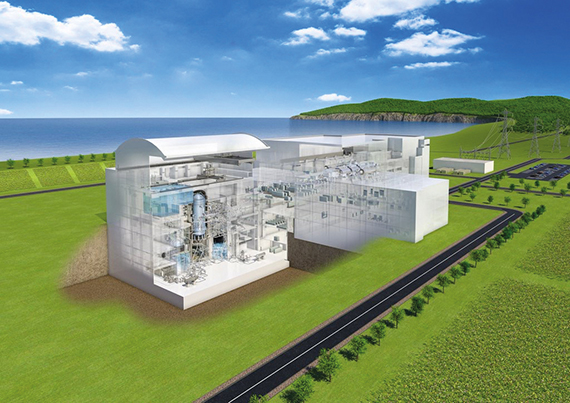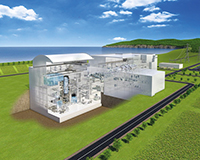 Perched on a remote site on the northern coast of Anglesey, a new generation of nuclear power station is being proposed which is expected to create huge demand for space. While that may cast a warm glow over the regional property market, it also forces it to confront a serious lack of supply.
Perched on a remote site on the northern coast of Anglesey, a new generation of nuclear power station is being proposed which is expected to create huge demand for space. While that may cast a warm glow over the regional property market, it also forces it to confront a serious lack of supply.
Hitachi-owned Horizon Nuclear Power is inching towards a £10bn plan for a 2,700MW Advanced Boiling Water Reactor – the first of its kind in Europe – at Wylfa Newydd. An application to the Planning Inspectorate for a development consent order should be made later this year.
Sasha Davies, Horizon’s head of strategic development for Wales, says a final investment decision would then follow in 2019 and, “all things being well”, construction would begin in late 2019 or early 2020, with electricity output from the mid-2020s.
The plant would create 850 permanent roles, thousands of construction jobs and ancillary development. And as Horizon develops its supply chain, it says there will also be a need for a supply of appropriate property.
Therein lies the challenge, because according to Chris Sutton, lead director of JLL in Wales, the island is fully occupied.
“Anglesey is short of accommodation and in my view there needs to be a significant build programme,” he says. “There is potential to address that with support for the private sector, but there also has to be direct build.”
Stephen Wade, director of Legat Owen, similarly highlights the paucity of space.
The Welsh Government, and its predecessor, have a good track in servicing land, he says, so providing sites that are “shovel ready” is a key role for them. But there is also a need to remove barriers to speculative development such as empty rates liabilities. “There needs to be pump priming of good quality employment land that is fully serviced and ready to go when demand arrives – because when it does, lead times will be incredibly short,” says Wade.
But a stumbling block for the island is viability. As Dylan Williams, head of regulation and economic development with Anglesey County Council, explains: “Cost of development is high but rentals are low so the payback period is substantial. This is a huge opportunity and one we must take advantage of, but it is at complete odds with where we are coming from at present.”
Public sector involvement means not only infrastructure investment but, says Williams: “Where we have serviced plots, we have to build space.” And the local authority is applying to the Welsh Government for funding to develop units itself. For its part, the government says it will be working with Horizon and other stakeholders to consider emerging demand and delivery options to meet it.
Anglesey does have some development gearing up for Wylfa Newydd. Work began recently on the 54,000 sq ft first phase of the Bangor University-owned Menai Science Park (M-SParc). Executive director Ieuan Wyn Jones says it has already received enquiries from companies interested in the region’s low carbon and renewable energy projects of which Wylfa Newydd is the largest.
Ben Bolton, director of Cooke & Arkwright, says R&D and technological sectors would benefit most from the power station and confirms, “that will partly drive the science park”.
Conygar’s Parc Cybi at Holyhead – a 120-acre employment site facilitated by the Welsh Government – sees Horizon working on proposals for its own 40,000 sq ft logistics centre to serve the plant during construction. Horizon’s Davies describes Parc Cybi as “very strategic”.
Legat Owen’s Wade, a joint agent on the scheme, says a truckstop at Parc Cybi, which will also deliver freight into the power station, plans an extension.
Meanwhile, Anglesey waits for Wylfa Newydd’s story to unfold – and the property world is pinning its hopes on some oven-ready sites and speculative development to play its part.
Nuclear know-how
Trawsfynydd in Snowdonia once boasted to be the only UK nuclear power station not on the coast. Now the decommissioned Magnox facility could become home to one of the world’s first small modular reactors. These have an output of less then 300MW and can be the size of a large warehouse. A government competition for suitable sites prompted Snowdonia Enterprise Zone to declare it “an ideal location”.
Chris Sutton, lead director of JLL, says the investment involves fewer on-site construction jobs, but would be a boost for the area. As Legat Owen director Stephen Wade says: “These areas have lived with nuclear power and have the expertise to deal with it.”











